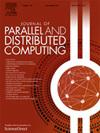DePoL:通过分散验证确保协作学习中的培训完整性
IF 3.4
3区 计算机科学
Q1 COMPUTER SCIENCE, THEORY & METHODS
引用次数: 0
摘要
协作学习使多个参与者能够共同训练复杂的模型,但容易受到模型中毒或后门攻击等攻击。确保训练的完整性可以通过阻止任何篡改的贡献影响模型来防止这些威胁。然而,在分散的环境中,传统的方法经常受到单点瓶颈或故障的困扰。为了解决这些问题,我们提出了一种基于重复执行的安全、可扩展、高效的去中心化验证框架DePoL。DePoL利用区块链将验证任务分布到多个参与者组成的组中,从而消除了单点瓶颈。在每个组中,冗余验证和基于多数的仲裁可以防止单点故障。为了进一步提高安全性,DePoL引入了一个两阶段的无剽窃承诺方案,以防止不受信任的验证者利用链上公共数据。此外,混合验证方法采用模糊匹配来处理不可预测的复制错误,而“慢路径”确保诚实的训练者零误报。我们的理论分析证明了DePoL的安全性和终端特性。广泛的评估表明,DePoL的开销与常见的分布式机器学习算法相似,但在可扩展性方面优于集中式验证方案,可将训练延迟减少高达46%。此外,DePoL有效地处理了0误报的复制错误。本文章由计算机程序翻译,如有差异,请以英文原文为准。
DePoL: Assuring training integrity in collaborative learning via decentralized verification
Collaborative learning enables multiple participants to jointly train complex models but is vulnerable to attacks like model poisoning or backdoor attacks. Ensuring training integrity can prevent these threats by blocking any tampered contributions from affecting the model. However, traditional approaches often suffer from single points of bottleneck or failure in decentralized environments. To address these issues, we propose DePoL, a secure, scalable, and efficient decentralized verification framework based on duplicated execution. DePoL leverages blockchain to distribute the verification tasks across multiple participant-formed groups, eliminating single-point bottlenecks. Within each group, redundant verification and a majority-based arbitration prevent single points of failure. To further enhance security, DePoL introduces a two-stage plagiarism-free commitment scheme to prevent untrusted verifiers from exploiting public on-chain data. Additionally, a hybrid verification method employs fuzzy matching to handle unpredictable reproduction errors, while a “slow path” ensures zero false positives for honest trainers. Our theoretical analysis demonstrates DePoL's security and termination properties. Extensive evaluations show that DePoL has overhead similar to common distributed machine learning algorithms, while outperforming centralized verification schemes in scalability, reducing training latency by up to 46%. Additionally, DePoL effectively handles reproduction errors with 0 false positives.
求助全文
通过发布文献求助,成功后即可免费获取论文全文。
去求助
来源期刊

Journal of Parallel and Distributed Computing
工程技术-计算机:理论方法
CiteScore
10.30
自引率
2.60%
发文量
172
审稿时长
12 months
期刊介绍:
This international journal is directed to researchers, engineers, educators, managers, programmers, and users of computers who have particular interests in parallel processing and/or distributed computing.
The Journal of Parallel and Distributed Computing publishes original research papers and timely review articles on the theory, design, evaluation, and use of parallel and/or distributed computing systems. The journal also features special issues on these topics; again covering the full range from the design to the use of our targeted systems.
 求助内容:
求助内容: 应助结果提醒方式:
应助结果提醒方式:


